HOW WE THINK
Digital Media and Contemporary Technogenesis
N. KATHERINE HAYLES
The University of Chicago Press
Chicago and London
N. Katherine Hayles is professor of literature at Duke University. Her books include How We Became Posthuman: Virtual Bodies in Cybernetics, Literature, and Informatics and Writing Machines.
The University of Chicago Press, Chicago 60637
The University of Chicago Press, Ltd., London
2012 by The University of Chicago
All rights reserved. Published 2012.
Printed in the United States of America
21 20 19 18 17 16 15 14 13 12 1 2 3 4 5
ISBN-13: 978-0-226-32140-0 (cloth)
ISBN-13: 978-0-226-32142-4 (paper)
ISBN-10: 0-226-32140-1 (cloth)
ISBN-10: 0-226-32142-8 (paper)
ISBN-13: 978-0-226-32137-0 (e-book)
Library of Congress Cataloging-in-Publication Data
Hayles, N. Katherine.
How we think : digital media and contemporary technogenesis / N. Katherine Hayles.
p. cm.
Includes bibliographical references and index.
ISBN-13: 978-0-226-32140-0 (hardcover : alkaline paper)
ISBN-13: 978-0-226-32142-4 (paperback : alkaline paper)
ISBN-10: 0-226-32140-1 (hardcover : alkaline paper)
ISBN-10: 0-226-32142-8 (paperback : alkaline paper) 1. Digital mediaPsychological aspects. 2. Communication and technology. 3. HumanitiesPhilosophy. 4. Cipher and telegraph codes. 5. Hall, Steven, 1975Raw shark texts. 6. Danielewski, Mark Z. Only revolutions. I. Title.
P96.T42H39 2012
302.23'1dc23
2011038467
 This paper meets the requirements of ANSI/NISO Z39.48-1992 (Permanence of Paper).
This paper meets the requirements of ANSI/NISO Z39.48-1992 (Permanence of Paper).
For my family
Contents
Figures
Acknowledgments
If every book is a collaborationa confluence of thoughts only some of which are original to the authorthis one is especially so. In the four or five years this book has been gestating, I have benefited from a great many conversations, books, interviews, comments, and feedback too numerous to mention. Some contributions are so central, however, that I am pleased to acknowledge them explicitly here. First, I thank those scholars who gave generously of their time in agreeing to have an interview with me and for trusting me to handle their comments with fidelity and integrity. These include Eyal Amiran, Jay David Bolter, Tanya Clement, Gregory Crane, Sharon Daniel, Philip J. Ethington, Alice Gambrell, Caren Kaplan, Matthew Kirschenbaum, Timothy Lenoir, Alan Liu, David Lloyd, Tara McPherson, Todd S. Presner, Stephen Ramsey, Rita Raley, and Jeffrey Schnapp. Kenneth Knoespel and Ian Bogost at the School for Literature, Culture and Communication at Georgia Tech provided useful information on their program, its aspirations and priorities. At Kings College London, I am especially indebted to Willard McCarty for arranging my visit there, as well as to Harold Short, Stephen Baxter, Arthur Burns, Hugh Denard, Charlotte Roueche, and Jane Winters for their willingness to allow me to interview them. At the Office of Digital Humanities at the National Endowment for the Humanities, I appreciate the help of Brett Bobley, Jason Rhody, and Jennifer Serventi in talking with me about their programs.
I am especially grateful to Fred Brandes for allowing me to photocopy many of his books and browse through the rest while researching the archival material discussed in . He also read through the manuscript and offered several corrections. I warmly remember and deeply appreciate his gracious hospitality, and I thank him for his generosity. I am indebted to the National Cryptologic Museum librarians for their help and encouragement, and I thank them for access to one of the largest intact telegraph code book collections in the United States. The collection was originally assembled when telegraphy was still alive (although long past its heyday), and the National Cryptologic Museum has worked to keep it as a valuable historical archive. I also thank John McVey, who has spent untold hours searching for telegraph code books that have been digitized, primarily in Internet Archive and Google Books, and has created bibliographic records and information for them. He has also compiled a valuable Resources page and other assets. I, along with anyone interested in this topic, am indebted to him for his fine and meticulous work. I am grateful as well to Nicholas Gessler for access to his Things That Think code book collection and for conversations, information, and explanations that make him my most treasured confidante.
I am indebted to Laura Otis, Marjorie Luesebrink, and Nicholas Gessler for reading drafts and giving valuable feedback. John Johnston, one of the readers of the manuscript for the University of Chicago Press, offered crucial guidance and useful insights that helped enormously in rethinking the books structure; also invaluable were the second readers insights and strong endorsement. I owe a large debt of thanks to George Roupe for his meticulous copyediting; this book would be much more error-pone if it had not been for his help. I am also grateful to Alan Thomas of the University of Chicago Press for his continuing guidance and strong support, and to the staff for their good work on this book.
In addition, I thank the National Endowment for the Humanities for support during summer 2009, when I participated in the Broadening the Humanities institute led by Tara McPherson and Steve Anderson at the University of Southern California. During the institute I began work on a website to accompany .
I owe a special debt of gratitude to Allen Beye Riddell, who coauthored the coda to on Mark Z. Danielewskis Only Revolutions. His tireless work on this project has made it much richer and more extensive than it otherwise would have been.
I am grateful to Steven Hall for permission to use images from The Raw Shark Texts in from Only Revolutions.
I am grateful to Joseph Tabbi and Benjamin Robertson at the Electronic Book Review for permission to reprint, in revised form, .
I am grateful to Palgrave Macmillan for permission to use an earlier version of , Mapping Time, Charting Data: The Spatial Aesthetic of Mark Z. Danielewskis Only Revolutions, appeared in Essays on Mark Z. Danielewski, edited by Alison Gibbons and Joe Bray (Manchester: Manchester University Press, 2011), 15977, and I am grateful to the University of Manchester Press for permission to reprint.
My greatest debt, as always, is to my friend, confidante, and partner, Nicholas Gessler. His comments, feedback, explanations, and help were invaluable. With his extraordinary technical knowledge, his truly amazing collections, and his warm friendship, he has not only made this book much better than it otherwise would be, but he has also made me much better than I otherwise would be.
How We Think
Digital Media and Contemporary Technogenesis
How do we think? This book explores the proposition that we think through, with, and alongside media. This, of course, is not a new idea. Marshall McLuhan, Friedrich Kittler, Lev Manovich, Mark Hansen, and a host of others have made similar claims. Building on their work, this book charts the implications of media upheavals within the humanities and qualitative social sciences as traditionally print-based disciplines such as literature, history, philosophy, religion, and art history move into digital media. While the sciences and quantitative social sciences have already made this transition, the humanities and qualitative social sciences are only now facing a paradigm shift in which digital research and publication can no longer be ignored. Starting from mindsets formed by print, nurtured by print, and enabled and constrained by print, humanities scholars are confronting the differences that digital media make in every aspect of humanistic inquiry, including conceptualizing projects, implementing research programs, designing curricula, and educating students. The Age of Print is passing, and the assumptions, presuppositions, and practices associated with it are now becoming visible as media-specific practices rather than the largely invisible status quo.
Next page
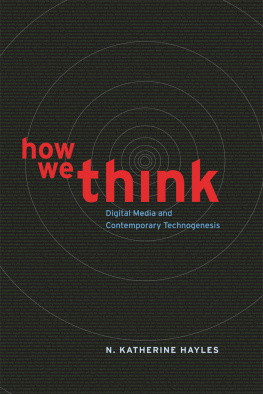
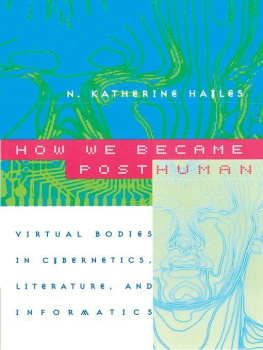
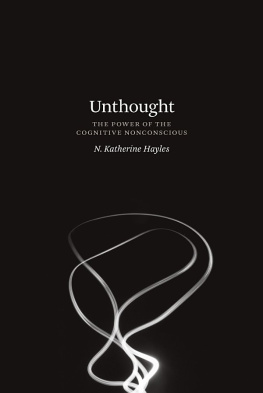

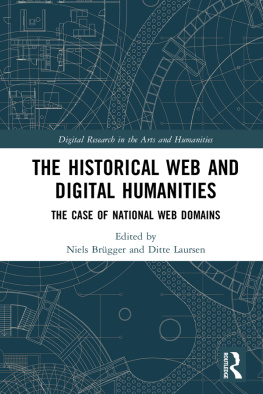
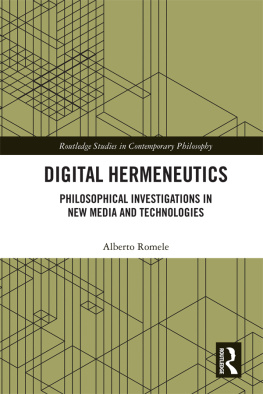
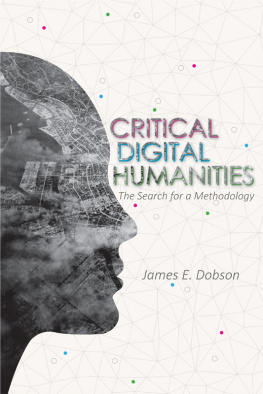
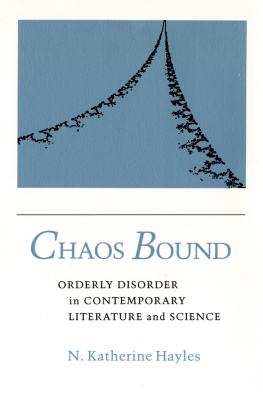
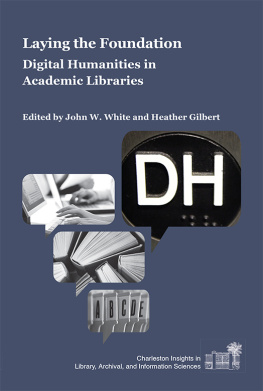
 This paper meets the requirements of ANSI/NISO Z39.48-1992 (Permanence of Paper).
This paper meets the requirements of ANSI/NISO Z39.48-1992 (Permanence of Paper).